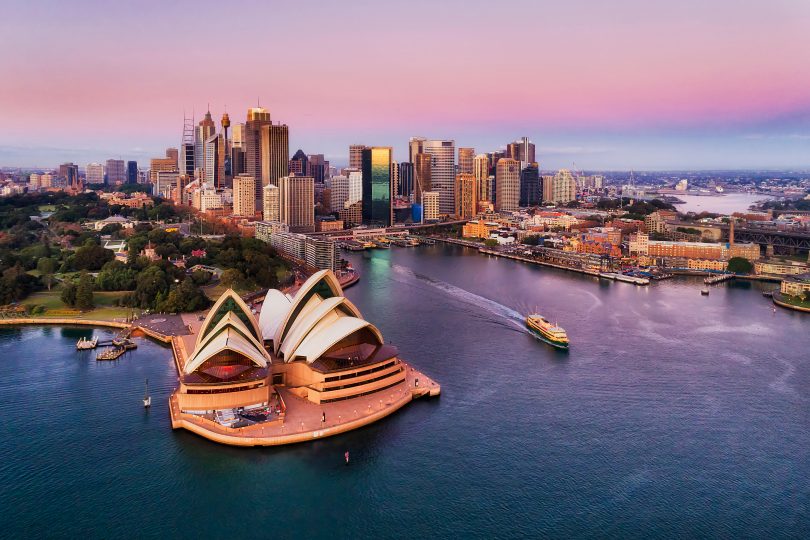Australia has made great strides in the last few years by loosening up their long-standing cannabis illegalization laws, and even started this year with the first step towards full legalization
Hey there, mate
Australia is known as a laid-back country. In fact, if you were to ask a person with no knowledge of current global cannabis regulation which country they thought would be most likely to have completely legal recreational cannabis, Australia would probably come to mind first. It’s the kind of place where from outside we assume they’re all getting stoned in there, while wrangling crocodiles, and trekking through the outback.
This isn’t quite the case. While not every Australian currently has the right to kick back and legally smoke their favorite version of recreational cannabis, medicinal cannabis has, in fact, cleared its way to federal approval, with specific provinces going even further than that.
Use the sign-up form to subscribe to the CBD Business Weekly Newsletter
Where the Down Under stands on cannabis regulation
Australia is similar to the US, and the EU in terms of having a federal governmental entity that sets federal requirements, as well as states, member states, or provinces that can set their own local legislation, leading to possible clashing between the two. In the US, cannabis is still federally illegal, but different states have legalized it for medical use, recreational use, or both, creating a clash between federal mandates and local laws.
Starting from 1913, Australia’s treatment of cannabis became more and more stringent (following along the same patterns as many other countries at the time.) Cannabis is illegal still under the federal government’s Narcotics Drug Act of 1967 along with amphetamines, MDMA, and heroin, with the explanation “They are banned because using them can endanger your health, your life, or the life of others. Because they are not regulated in the way legal drugs are you can never be sure what’s in them or how strong they are.”
Australia is made up of eight provinces that have their own local laws for cannabis use, aside from these federal mandates.
Medicinal approved!
On October 17th of 2015, the Australian federal government authorized cannabis to be grown for medicinal and scientific use, and on February 24th 2016 the Federal government amended the Narcotics Drug Act of 1967 to allow for this to happen. This was followed by the legalization of medical cannabis on November 1st, 2016 at the federal level.
Canberra goes legal
The (possibly) more interesting advancement in the fight for legal cannabis in Australia came just this year. On September 25th of 2019, the Australian Capital Territory (ACT) which houses Canberra, the capital city of Australia, announced they’d be legalizing cannabis in that district with the following stipulations:
- An adult (18+ years) can have up to 50 grams of dry cannabis or 150 grams of damp cannabis.
- An individual can have two plants, and a household up to four plants.
- Plants must be grown in places inaccessible to the public.
- Cannabis must be used for personal use.
- Cannabis must be used in places inaccessible to minors, and must be stored where minors can’t reach it.
- The use of hydroponics and artificial cultivation are not allowed.
Some unchanged laws include:
- It’s still illegal to share, give, or sell cannabis to another person.
- It’s still illegal for anyone under 18 to possess, use, sell, or have anything to do with cannabis.
- It’s still illegal to drive while under the influence of cannabis.
The new laws went into effect January 31st 2020, making ACT the first place in Australia to legally use recreational cannabis.
What about Cannabis in the rest of Australia?
The Australian Capital Territory is one of eight provinces in Australia, and as of yet, the only one to introduce and pass laws to legalize cannabis use. The other seven provinces have their own laws which could in coming years move closer to full legalization as well. For now, this is where they stand.
Australian Cannabis Firm Leaps Into U.K. Market
- Province of South Australia – Under the Controlled Substances Act of 1984, small amounts of cannabis have been decriminalized, and receive a fine no larger than a traffic ticket. There are, however, harsher penalties for growing since cultivation has increased of late. In fact, larger scale growing and trafficking can garner a $50k-500k fine and/or 15 years of imprisonment. Cannabis resins and oils are also considered controlled substances under this act.
- Province of Western Australia – If caught in Western Australia with 10 grams or less, you’re likely to end up in counselling sessions through a Cannabis Intervention Requirement. Larger quantities can incur jail time, or a weighty fine. There are also limitations to how cannabis smoking paraphernalia can be displayed in windows with jail time and large fines for those who break the law including $10k for selling to adults, and 24k for selling to minors.
- Province of Queensland, Province of Tasmania, Province of New South Wales, Province of Victoria – These provinces all consider recreational cannabis use to be a criminal offense, however offenders are unlikely to see jail time due to diversion programs in these provinces meant to encourage education, assessment, and treatment when necessary. All except Queensland give cautions for different infractions of the law, which equal different levels of intervention and treatment. Queensland is a bit different, offering up a hefty prison sentence of 15 years for 500 grams or below, and 20 years for over 500 grams under their Drugs Misuse Regulation 1987 policy. Smaller amounts require drug diversion programs like the other provinces. Interesting point about Queensland – if a person is caught with up to 50 grams, and admits to carrying it, while not committing any other crimes, under the Police Powers and Responsibilities Act 2000, the offender must be offered a treatment program. There are some other specifics as well. New South Wales, up to 15 grams can be given two cautions according to police discretion. Up to three cautions can be issued in Tasmania for up to 50 grams. In Victoria, as much as 50 grams will garner one caution and attendance in a program, or two cautions and no program.
- Province of Northern Territory – Under the Northern Territory’s Misuse of Drugs Act, it is illegal to cultivate, supply, or possess cannabis without a license to do so. In this territory, adults over 18 years of age found with 50 grams or less of cannabis can be fined up to $200 rather than face criminal charges so long as they pay within 28 days. In the Northern territory, fines come with penalty units of a certain value. Cannabis is generally thought to be essentially decriminalized in this sector, however using cannabis in public can still incur imprisonment.
What about CBD?
While CBD itself is not psychoactive like it’s cannabinoid counterpart THC, it often gets lumped in with it, even though it provides numerous health benefits in studies. In Australia, CBD is technically legal, but as a medicine, which means that it should only be accessed by medical patients.
The Top 5 Medical Uses for CBD
In 2018, health ministers at both the national and state level approved the trade of hemp products in Australia, but with the stipulation that all products must have below .005% THC, a rather stringent benchmark for THC in hemp. Weirdly, Australia has some of the more strict laws when it comes to hemp cultivation and trade, and farmers not even intending to grow crops with a higher than allowed THC amount have been ordered to get rid of their crops or face indictment because of accidentally having higher than the .005% THC.
With all that said on the legal side, CBD has garnered enough global support recently that pretty much anyone over the age of 18 can buy CBD oil – or other CBD products – pretty much anywhere in Australia. Chances are the laws will be further updated soon to account for this.
Conclusion – Cannabis in Australia
While Australia can’t take the title of the most laid-back country when it comes to cannabis (that probably goes to Canada at this point), it is a country that has made major strides in the last few years to get better up to date with today’s cannabis culture. And good thing, because the people of Australia have been way ahead of these laws for years already, getting stoned on Australia’s finest, while wrangling crocodiles and trekking through the outback.
Thanks for checking in at CBDtesters.co, come back frequently and subscribe to the CBD Business Weekly Newsletter to keep up-to-date on everything CBD, hemp, and legal-cannabis related.








Maximum THC content for hemp in Australia is dependant on the state or territory usually 0.5 – 1% THC not 0.005%